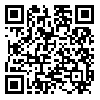Volume 5, Issue 2 (Occupational Medicine Quarterly Journal 2013)
tkj 2013, 5(2): 66-73 |
Back to browse issues page
Farahnaz Dastranj * 
 , Faramarz Helali
, Faramarz Helali 
 , Abolfazl Barkhordari
, Abolfazl Barkhordari 
 , Amir Houshang Mehrparvar
, Amir Houshang Mehrparvar 
 , Mahmoud Mahmoudi
, Mahmoud Mahmoudi 


 , Faramarz Helali
, Faramarz Helali 
 , Abolfazl Barkhordari
, Abolfazl Barkhordari 
 , Amir Houshang Mehrparvar
, Amir Houshang Mehrparvar 
 , Mahmoud Mahmoudi
, Mahmoud Mahmoudi 

, dastranj.farahnaz@yahoo.com
Abstract: (10010 Views)
Background: Access of organizations to ergonomics, especially in developing countries is difficult. Therefore development of knowledge for application of ergonomics in job modification and productivity is necessary. It is fundamental for industries in such developing countries as Iran, in which there is need for applied research on action learning. Ergonomic interventions are among the methods for reducing ergonomic exposures. Participatory ergonomics as a new intervention in the workplaces is increasingly being used. This study was designed to use ILO ergonomic checkpoints to detect the proper trend of safety, health, and work conditions for comparison of safety, health and workplace situation by a participatory ergonomics approach.
Methods: This was a cross-sectional descriptive–analytic study conducted in a pharmaceutical industry. At first safety, health and work conditions was assessed by an industrial hygienist and then by a participatory ergonomics approach 60 subjects were assessed in technical sessions by ILO ergonomics checkpoint.
Results: The scores of different branches (i.e. safety, hygiene, health and work conditions) resulted from checkpoints completed before and after the application of checklists with participatory ergonomics approach and action learning showed that for one unit increase in each score before intervention, the score after intervention was increased 0.3 which was statistically significant.
Conclusion: According to the results of theoretical and experimental documents, technical and social skills and capabilities of subjects will increase after application of a participatory ergonomics process and will create reliability and motivation for involvement, participation and cooperation in order to solve the problems of safety, hygiene, health and work conditions
Type of Study: Research |
Subject:
Ergonomics
Received: 2012/11/17 | Accepted: 2013/09/11 | Published: 2013/09/11
Received: 2012/11/17 | Accepted: 2013/09/11 | Published: 2013/09/11
| Rights and permissions | |
 |
This work is licensed under a Creative Commons Attribution-NonCommercial 4.0 International License. |
